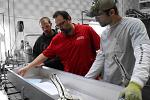- FMA
- The Fabricator
- FABTECH
- Canadian Metalworking
Categories
- Additive Manufacturing
- Aluminum Welding
- Arc Welding
- Assembly and Joining
- Automation and Robotics
- Bending and Forming
- Consumables
- Cutting and Weld Prep
- Electric Vehicles
- En Español
- Finishing
- Hydroforming
- Laser Cutting
- Laser Welding
- Machining
- Manufacturing Software
- Materials Handling
- Metals/Materials
- Oxyfuel Cutting
- Plasma Cutting
- Power Tools
- Punching and Other Holemaking
- Roll Forming
- Safety
- Sawing
- Shearing
- Shop Management
- Testing and Measuring
- Tube and Pipe Fabrication
- Tube and Pipe Production
- Waterjet Cutting
Industry Directory
Webcasts
Podcasts
FAB 40
Advertise
Subscribe
Account Login
Search
Demand for manufacturing talent still rising despite slow growth rate
- October 11, 2016
- News Release
- Shop Management
Hanover, Md.-based Aerotek, a provider of industrial staffing services, has released its second annual list of "Opportunities in Manufacturing," including the top 10 fast-growing U.S. industries for manufacturing employment, as well as the top states driving employment. Although the Bureau of Labor Statistics reports a softening in the manufacturing industry, Aerotek notes the demand for manufacturing talent is still critical.
Some of the manufacturing industries showing employment growth in 2015-2016 are:
- Oil and gas field machinery and equipment: 7 percent
- Metal tank (heavy gauge): 5 percent
- Fabricated pipe and pipe fitting: 3 percent
- Truck trailer: 3 percent
- Farm machinery and equipment: 2 percent
The top states for manufacturing employment are:
- California.
- Texas.
- Indiana.
- Michigan.
- Iowa.
According to Sara Staggs, director of divisional operations for Aerotek's Commercial Division, the industry softening is in response to market forces, including the global economic downturn outside the U.S., a strong dollar, and increasing competition from companies abroad.
"Despite the slower growth, finding talent is still one of the greatest challenges for manufacturing today," said Staggs. "Machinists, production workers, and assemblers are among the top occupations in demand, while workers with skilled trade backgrounds such as welding and machining also are in high demand.
"Positions in the highest demand are:
- General production worker: 43,100
- Light industrial assembler: 19,648
- Machine operator: 6,050
- Maintenance tech/mechanics: 5,465
- Welder: 3,818
This talent need is driven primarily by the rate of retirement and the reduction in supply of new workers entering the industry. About 2.7 million workers will retire from the manufacturing industry in the next decade or so, according to a 2015 report by Deloitte and The Manufacturing Institute, and they're not easily replaced.
The manufacturing industry has continued to evolve, relying more heavily on the operation, maintenance, and programming of high-tech machines, and shifting away from the outdated stigma of the manufacturing industry is critical to attracting talent. Millennials, who are well-accustomed to using high-tech devices, have great potential to embrace the increasingly sophisticated world of skilled trades.
subscribe now

The Fabricator is North America's leading magazine for the metal forming and fabricating industry. The magazine delivers the news, technical articles, and case histories that enable fabricators to do their jobs more efficiently. The Fabricator has served the industry since 1970.
start your free subscription- Stay connected from anywhere

Easily access valuable industry resources now with full access to the digital edition of The Fabricator.

Easily access valuable industry resources now with full access to the digital edition of The Welder.

Easily access valuable industry resources now with full access to the digital edition of The Tube and Pipe Journal.
- Podcasting
- Podcast:
- The Fabricator Podcast
- Published:
- 04/16/2024
- Running Time:
- 63:29
In this episode of The Fabricator Podcast, Caleb Chamberlain, co-founder and CEO of OSH Cut, discusses his company’s...
- Industry Events
16th Annual Safety Conference
- April 30 - May 1, 2024
- Elgin,
Pipe and Tube Conference
- May 21 - 22, 2024
- Omaha, NE
World-Class Roll Forming Workshop
- June 5 - 6, 2024
- Louisville, KY
Advanced Laser Application Workshop
- June 25 - 27, 2024
- Novi, MI






























